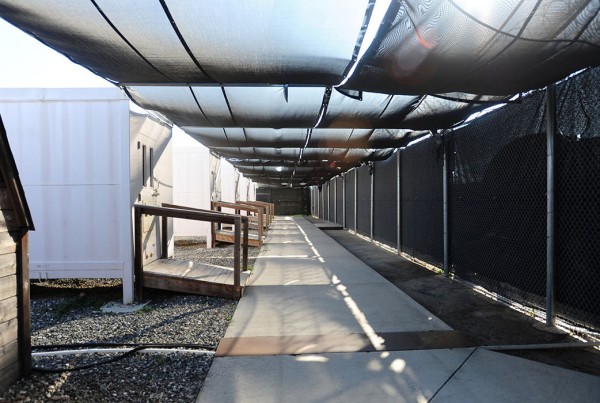Ban on Female Guards Hurt Morale But Not Security, Commanders Testify
By John Ryan | December 9, 2015 | Lawdragon News, Guantanamo Bay

A view of the detainee holding cells near the court where the five Sept. 11 defendants will be tried. (Photo courtesy of Joint Task Force Guantanamo, Public Affairs.)
GUANTANAMO NAVAL BASE, CUBA – A ban on female guards moving detainees to legal meetings and court sessions did not result in any documented security breakdowns at Camp 7 or during transports, a former commander of the detention facility testified on Wednesday.
A Colorado Army National Guard Major identified only as “Major Prior” gave the testimony by video in response to questions by Walter Ruiz, the lead attorney for Mustafa al Hawsawi, one of the five defendants in the Sept. 11 case for which pretrial hearings resumed this week at Guantanamo Bay.
Prior, who ran the camp from December 2014 to August 2015, is the second former Camp 7 commander to testify this week on the judge’s female guard ban, a temporary order that the government opposes. Department of Defense officials have sharply criticized the ban and female guards have filed a discrimination complaint against the judge, Army Col. James Pohl. Prior’s immediate predecessor testified on Tuesday.
Though he could not attribute a security breakdown to the ban, Prior did not mince words when asked by government trial counsel Robert Swann about its overall impact. Prior said it negatively affected “operational readiness,” “destroyed the morale” of his unit and caused soldiers to leave the service, which he called “an embarrassment to our armed forces.”
Defense attorneys treated these statements with skepticism during re-direct examination, noting that the ban only applies to the five defendants and their case-related movements – not to their moves within the facility, such as to the recreation, media or medical areas. Camp 7 houses 14 high-value detainees, including the five Sept. 11 defendants; the total number of detainees at Guantanamo Bay is 107.
As with past motions, defense lawyers invoked the past treatment of their clients and Wednesday – which marked the one-year anniversary of the release of the executive summary of the Senate Intelligence Committee Report on Torture – was no different. The attorneys claim that torture at CIA black sites, including sexual humiliation, amplifies the distress their clients feel when touched by female guards.
Both former commanders testified that while they received some cultural training about the detainees' religious beliefs they did not do in-depth research about the defendants' past experiences, such as any past torture, before the detainees arrived at Guantanamo Bay in 2006.
Wednesday ended with the in-person testimony of the current Camp 7 commander, identified only as “Major,” who began his testimony on Oct. 30.
The commander said that the female-guard ban had not caused any security breaches, though he added that it could create future challenges if any guards happen to leave the unit for other reasons.
Standoff Over Conflicting Red Cross Visit
Time is a precious commodity in the long-pending military commission, which aims to meet in one-week or two-week installments at Guantanamo Bay every few months until a trial is held. (An FBI investigation into one of the defense teams caused a delay of about 1-1/2 years.) Judge Pohl was somewhat frustrated on Wednesday morning when al Hawsawi was not present without having voluntarily waived his right to be in court.
Defendants must be in court during the first day of each session but can stay back at Camp 7 on subsequent days if they sign a waiver. Al Hawsawi told the a guard that he could not not voluntarily waive his right to be in court Wednesday because he had an 11 a.m. meeting with the International Committee of the Red Cross (ICRC), which visits detention facilities around the world to ensure safe and humane treatment. Pohl wondered why the meeting was scheduled at that time given that he had issued his hearing schedule about a year in advance. (A JTF spokesman referred questions about the conflict to the ICRC, which later issued a statement to the Miami Herald that its dialogue with government authorities over scheduling matters are confidential.)
Pohl said that, if al Hawsawi did not voluntarily waive his right, the Joint Task Force (JTF) guard had to bring him to court.
He said the situation created a “Hobson’s choice” for al Hawsawi about whether to attend court or go to his ICRC meeting. Army Brig. Gen. Mark Martins, the chief prosecutor of the military commissions, disagreed with the reference. He said the military commission was the clear priority, and that the ICRC meeting could be rescheduled.
Martins said he was not minimizing the importance of the ICRC visits, which are appropriate given that Camp 7 is “a law-of-war facility.”
Pohl didn’t want to issue blame in deference to the different government branches involved, which prevented “unity of command.” He urged better coordination with the JTF.
“There are all sorts of fingers in this pie,” the judge said.
The morning session never moved forward. In the end, al Hawsawi waived his right to attend the afternoon session that began at 1:15pm.

